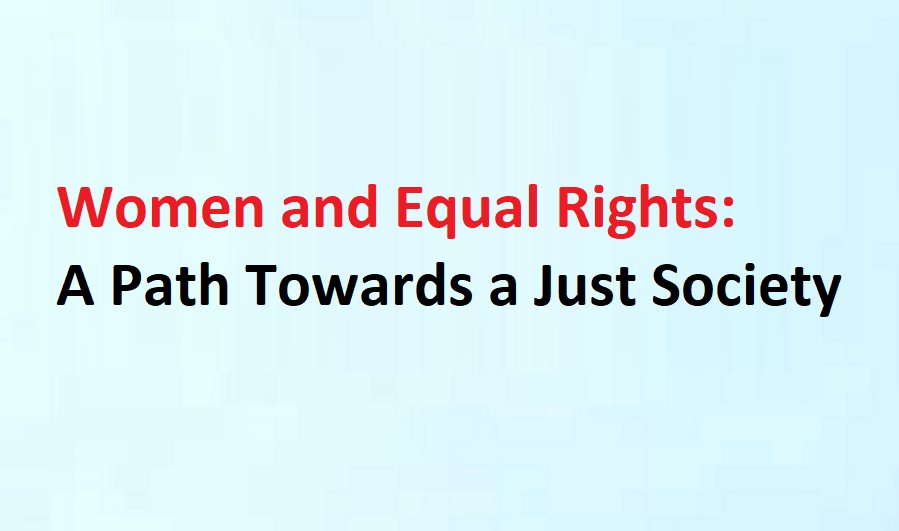
Chowdhury Kabir
06 May, 2025 03:06
Women and Equal Rights: A Path Towards a Just Society

In many parts of the world, women are still deprived of their fundamental rights. Despite numerous movements and struggles aimed at securing women's rights, their position in society remains unequal in various ways. Equal rights is a core concept that represents the idea that every individual, regardless of gender, should have the same rights, opportunities, and dignity. This article explores the importance of equal rights for women and how it contributes to the creation of a just society.
Women's Rights: A Fundamental Human Demand
When discussing equal rights for women, it's essential to understand that this is not just a theoretical or ideological matter but a practical and institutional process. Achieving equal rights goes beyond policy changes; it is about ensuring equal opportunities, dignity, and respect for both women and men in every sphere of life, whether in the family, workplace, or society at large. Societal norms, historically patriarchal in nature, need to evolve to acknowledge that gender equality is a fundamental principle that benefits everyone, not just women.
Women's rights are essentially human rights. The empowerment of women is not only about uplifting women but about fostering an inclusive society where everyone’s voice is heard and valued. Equal rights mean that women should have the same access to education, healthcare, economic opportunities, and political participation as men. Women's rights are not a privilege that should be granted by men; they are inherent to all individuals. Equal rights can only be realized when societal structures acknowledge and enforce them.
"Rights Given" vs. "Rights Established"
One of the fundamental issues in the conversation about women’s rights is the prevailing belief that "men give women their rights." This idea fundamentally misconstrues the nature of rights, presenting men as the benefactors and women as the supplicants. This concept not only perpetuates gender inequality but also reinforces the patriarchal structure, where men are seen as superior and women as dependent.
In reality, equal rights are not about granting or giving rights from one gender to another; they are about recognizing inherent human dignity. The idea of equal rights is that both men and women have the right to claim and assert their rights, without seeking permission from the other gender. Rights are not given; they are established. They are inherent to all human beings, regardless of gender, and are self-initiated—meaning that every person has the right to assert their dignity and demand fair treatment without seeking permission from someone in a more privileged position.
Gender Equality: A Shared Process
The goal of gender equality is not simply about one group receiving rights from another but about establishing a system where both men and women have equal agency to claim their rights. Equal rights cannot be achieved when society continues to see women as needing permission to access certain rights. Nor can it be achieved when men are placed in a position of power where they are thought to be the ones "allowing" women to have rights. Rather, it should be a shared process where both genders work together to ensure equality and mutual respect.
In an ideal society, gender equality would be an inherent part of every institution, from government to education, from the workplace to the home. Women should not have to fight for their rights, nor should they have to wait for men or any institution to give them the recognition they deserve. Instead, women should be empowered to claim their rights independently, as should men. Gender equality should be framed not as a struggle between genders but as a cooperative effort to ensure that everyone enjoys the same rights and opportunities.
Breaking Down the Patriarchal Framework
When we discuss women’s rights, we often implicitly subscribe to a patriarchal worldview in which men are placed in positions of power. This belief structure leads to the assumption that women’s rights are something that must be granted by men, reinforcing the societal norm that men are the “providers” of rights, while women are the “receivers.” This creates an imbalance of power and reinforces gender stereotypes that leave women dependent on men.
For instance, the idea that "men give women their rights" subtly places men in an elevated, ruling position while positioning women as subordinates. In reality, however, rights are not bestowed by one person to another but are a universal entitlement that everyone possesses equally. If we continue to view rights as something granted by men, we are only perpetuating a cycle of inequality and maintaining a gendered power structure.
To break this cycle, we must reshape our societal frameworks to promote mutual respect and the understanding that gender equality is the goal. Both men and women must recognize that they are equal partners in the pursuit of social justice, and neither gender is superior to the other. Women must be empowered to demand their rights without seeking permission, just as men should understand that their rights and privileges are not superior to those of women.
The Path Forward: Mutual Empowerment
The path forward is not about creating a world where one gender “gives” the other their rights but about mutual empowerment. Both women and men must work together to establish a society where both can live with equal dignity, respect, and freedom. This includes fighting against gender-based violence, ensuring equal pay for equal work, ensuring that women have access to education, healthcare, and political participation, and challenging discriminatory laws and practices that perpetuate inequality.
Moreover, men’s roles in gender equality should not be overlooked. Men must actively participate in dismantling the structures that perpetuate inequality. They should advocate for policies that ensure equal opportunities for women and actively challenge the ingrained patriarchal systems that harm both women and men. It is only by working together that we can create a truly equal and just society.
Conclusion
In the struggle for gender equality, women's rights are not a favor granted by men, nor are they a privilege dependent on the goodwill of a patriarchal system. Equal rights are inherent to all human beings, and it is the responsibility of society—both women and men alike—to ensure they are recognized and respected. Only when both genders work together in mutual empowerment can we hope to achieve a society where everyone, regardless of gender, can enjoy the same opportunities and freedoms. This is the foundation of a just society where human dignity is respected, and rights are universally upheld.







 সিলেট সিপিবি সাধারণ সম্পাদক সুমন ‘আটক’
সিলেট সিপিবি সাধারণ সম্পাদক সুমন ‘আটক’ 




 IT Lab Solutions Ltd.
IT Lab Solutions Ltd.
আপনার মন্তব্য